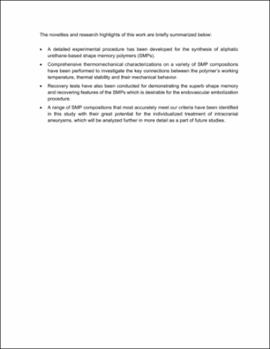| dc.contributor.author | Kunkel, Robert | |
| dc.contributor.author | Laurence, Devin | |
| dc.contributor.author | Wang, Jingyu | |
| dc.contributor.author | Robinson, Donnie | |
| dc.contributor.author | Scherrer, Joshua | |
| dc.contributor.author | Wu, Yi | |
| dc.contributor.author | Bohnstedt, Bradley N. | |
| dc.contributor.author | Chien, Aichi | |
| dc.contributor.author | Liu, Yingtao | |
| dc.contributor.author | Lee, Chung-Hao | |
| dc.date.accessioned | 2018-10-16T15:01:15Z | |
| dc.date.available | 2018-10-16T15:01:15Z | |
| dc.date.issued | 2018 | |
| dc.identifier.citation | Kunkel, Robert, Devin Laurence, Jingyu Wang, Donnie Robinson, Joshua Scherrer, Yi Wu, Bradley N. Bohnstedt, Aichi Chien, Yingtao Liu, and Chung-Hao Lee. "Synthesis and characterization of bio-compatible shape memory polymers with potential applications to endovascular embolization of intracranial aneurysms." Journal of the mechanical behavior of biomedical materials (2018). | en_US |
| dc.identifier.uri | https://hdl.handle.net/11244/301843 | |
| dc.description | This is the post print for the version of record: Kunkel, Robert, Devin Laurence, Jingyu Wang, Donnie Robinson, Joshua Scherrer, Yi Wu, Bradley N. Bohnstedt, Aichi Chien, Yingtao Liu, and Chung-Hao Lee. "Synthesis and characterization of bio-compatible shape memory polymers with potential applications to endovascular embolization of intracranial aneurysms." Journal of the mechanical behavior of biomedical materials (2018). This post print is licensed CC BY-NC-ND and was retrieved from http://www.ou.edu/coe/ame/bbdl/publications. | en_US |
| dc.description.abstract | Intracranial aneurysms (ICAs) are focal dilations in the brain's arteries. When left untreated, ICAs can grow to the point of rupture, accounting for 50–80% of subarachnoid hemorrhage cases. Current treatments include surgical clipping and endovascular coil embolization to block circulation into the aneurysmal space for preventing aneurysm rupture. As for endovascular embolization, patients could experience aneurysm recurrence due to an incomplete coil filling or compaction over time. The use of shape memory polymers (SMPs) in place of conventional platinum coils could provide more control and predictability for mitigating these complications. This study was focused on characterization of an aliphatic urethane-based SMP to evaluate its potential as a novel biomaterial for endovascular embolization. Twelve compositions of the SMP were synthesized and their thermomechanical properties together with the shape recovery behavior were comprehensively investigated. Our results showed that the SMPs experienced a significant decrease in storage and loss moduli as heated above their glass transition temperatures (32.3–83.2 °C), and that all SMPs were thermally stable up to 265 °C. Moreover, the SMPs exhibited both composition-dependent stress relaxation and a decrease in elastic modulus during cyclic loading. The shape recovery time was less than 11 s for all SMP compositions, which is sufficiently short for shape changing during embolization procedures. Several candidate compositions were identified, which possess a glass transition temperature above body temperature (37 °C) and below the threshold of causing tissue damage (45 °C). They also exhibit high material strength and low stress relaxation behavior, suggesting their potential applicability to endovascular embolization of ICAs.
This is the post print for the version of record: Kunkel, Robert, Devin Laurence, Jingyu Wang, Donnie Robinson, Joshua Scherrer, Yi Wu, Bradley N. Bohnstedt, Aichi Chien, Yingtao Liu, and Chung-Hao Lee. "Synthesis and characterization of bio-compatible shape memory polymers with potential applications to endovascular embolization of intracranial aneurysms." Journal of the mechanical behavior of biomedical materials (2018). This post print is licensed CC BY-NC-ND and was retrieved from http://www.ou.edu/coe/ame/bbdl/publications. | en_US |
| dc.language | en_US | en_US |
| dc.rights | Attribution-NonCommercial-NoDerivatives 4.0 International | * |
| dc.rights.uri | https://creativecommons.org/licenses/by-nc-nd/4.0/ | * |
| dc.subject | Shape memory polymers | en_US |
| dc.subject | Polyurethane | en_US |
| dc.subject | Glass transition temperature | en_US |
| dc.subject | Thermo-mechanical properties | en_US |
| dc.subject | Endovascular embolization | en_US |
| dc.title | Synthesis and characterization of bio-compatible shape memory polymers with potential applications to endovascular embolization of intracranial aneurysms | en_US |
| dc.type | Article | en_US |
| dc.description.peerreview | Yes | en_US |
| dc.identifier.doi | 10.1016/j.jmbbm.2018.08.037 | en_US |
| ou.group | College of Engineering::School of Aerospace and Mechanical Engineering | en_US |

